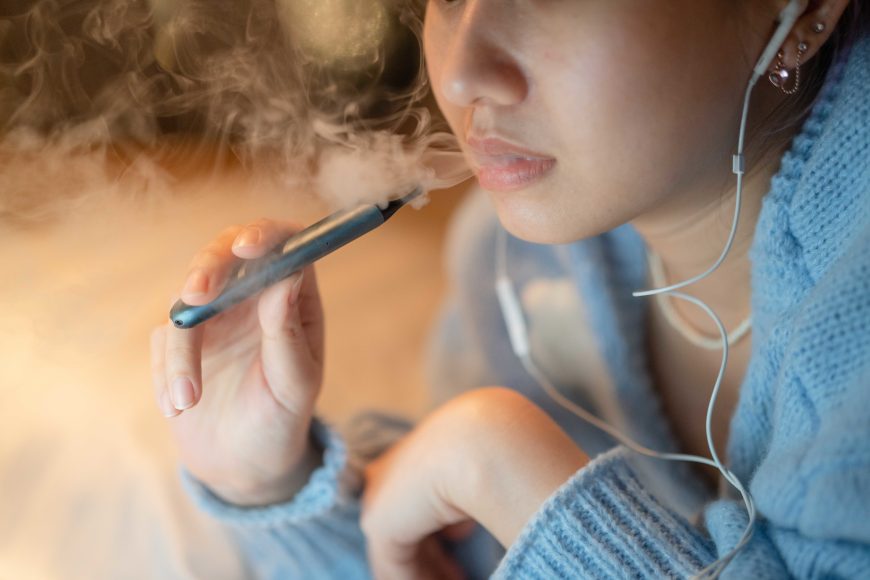It isn’t your imagination. Moms (and dads) are noticing more and more kids vaping. There are plenty of reasons why it’s caught on so quickly. With “fun” flavors and toy-like pens, vaping seems downright cool. This is reminiscent of the way cigarettes were marketed between the 1940s and 1990s. But the truth about targeting young kids with something so addictive is dark. There are plenty of reasons to be concerned about the immediate and long-term health risks like cancer and lung damage. In a 2022 study, over 2.5 million tweens and teens were vaping, and the 2023 survey by the FDA reported similar trends. That’s a lot of kids! Especially considering it is illegal to sell vaping tools to kids under 18, the number is staggering. Plus, it is growing. It’s a national issue that moms are taking to heart.
It is still too soon to have statistics about kids, vaping, and lung cancer. Kids who are vaping now are relatively young and cancer can take years to develop. But kids will grow up, and if they vape now, they will likely need to be screened and monitored for lung cancer just as kids, teens, and adults need to be screened if they smoke tobacco products.

As overwhelming as all of this is, thankfully, there are things you can do now to prevent your child from trying vaping and a lot you can do to help them stop if it has become a habit.
Get Grounded
Before you ground anyone for vaping, it is best to ground yourself before bringing up the topic. (Pun intended!) Take a deep breath; be aware of how your body feels; try and be present in just this moment with your kid. Speaking from a calm and caring place, not one of judgment and fear, can help your kid tell the truth about vaping. Maybe they saw a friend vape at a party or at school. Maybe they vaped and didn’t know what they were doing. Maybe they are addicted. It’s easy to get upset at something so scary and harmful. But the important thing is to be able to bring the topic up and start a calm discussion. Staying centered will help everyone as you talk about it.
Be Curious
Okay, so you are getting ready for “the talk,” but what do you even say? Maybe not a whole lot. Asking questions may go a long way rather than rattling off scary facts. Here are some questions you can ask your child that may help you learn more about vaping and how your child has (or hasn’t) experimented with it. These were adapted from the American Lung Association’s conversation guide, which has comprehensive advice on how to prepare for a discussion, what to say during it, and how to keep the conversation going over time.
- How do you feel about vaping?
- Have you considered trying it? (Why or why not?)
- Why do you think Juul and other vape products smell and taste like candy?
- What do you know about vaping and your health? Does it seem risky?
- Can I share some things about it that concern me?
- Would you like to practice how to say “no” if a friend wants you to vape?
Or if you already know your kid has started vaping, start the conversation directly, perhaps like this: Hey, I noticed you started vaping. I am concerned about that given some of the possible health effects and wanted to talk to you about it so we are on the same page.
 Feel Supported
Feel Supported
Like any concern, you may question if you’re being too sensitive. Not. At. All. You’re not being a worry wart. And you’re not alone in being concerned about the health of your kiddos and them vaping or starting to vape or being exposed to second-hand vaping. There’s a national effort underway to help keep kids safe. The U.S. Food & Drug Administration (FDA), a government agency charged with protecting public health, is taking note of the uptick in what they call “e-cigarette” use in under-aged populations. Use has jumped. More and more tweens and teens under 18 are vaping. While all of the health impacts aren’t known, what we do know isn’t good. Vapor contains not just addictive nicotine but can carry heavy metals like nickel and lead right into lungs (significant since these metals are known to elevate cancer risk). While cancer is one concern, often for younger people that is something that happens to “old people”. The reality is vaping or the use of e-cigarettes has been associated with the development of EVALI (e-cigarette-or vaping-associated lung injury) which can lead to severe breathing challenges in the short-term including ICU admission as well as altered cognitive ability and difficulties with breathing long term. Plus vaping has also been anecdotally linked with other health issues such as seizures. Yikes!
Seek Resources
Here’s a silver lining in a dark situation. Because vaping among teens has been labeled as an “epidemic,” there are many different organizations offering resources. There are cessation programs, ways to concretely talk about vaping (cost, health risks, etc.), and other ways to get support. If your child or children are needing help, the FDA’s The Real Cost page may help you feel surer about how to act. And there are more parent-led, local, and grassroots efforts as well.
 Stay Approachable & Pay Attention
Stay Approachable & Pay Attention
No parent wants to be a spy. You want to keep your kids’ trust, which is why laying the groundwork for good communication about vaping (and other hard to talk about topics) is so important. But you certainly can’t trust manufacturers of vaping products. They intentionally make their products appealing to kids, and they know how to pivot when they need to. So when fruity flavors that taste and smell like candy started getting legal attention, they changed their strategy to how their products look. Now vaping tools look like any toy you could find in a backpack. The FDA is increasing warnings about this shift and as recently as June 2023 sent letters to major offenders. By paying attention to things you can observe like how your kid smells (yes, really!) and acts, you really are taking action. Most of all keep nurturing the trust you have with your child or children. You want to be there for them.
Kick the Habit
Kids aren’t the only ones attracted to vaping (or smoking). The truth is that many kids see someone they admire (a mom, an uncle, an older sibling) vape or smoke. Witnessing this can be a big factor in their decision to try it. So if you are vaping or smoking, you can help your kiddo and yourself at the same time by trying to stop. Cessation programs like the one at Siteman Cancer Center work by giving support in a non-judgmental way. Once you quit, the benefits are almost immediate in reducing health risks for you and your family. And if you’ve quit smoking or not, talking to your doctor about getting screened for lung cancer is always an action you can take. Early detection means many treatment options for cancer care. To learn more about lung cancer screenings, visit GetScreenedNow.com.

Andrea Martin is a Content Strategist at Siteman Cancer and joined the team in 2023. Her writing connects patients with helpful information as they navigate their cancer journey. While not a mom, she is a devoted helicopter parent to her cat, Captain.
Sources and Resource links:
FDA 2023 E-Cigarette Use Survey Results
American Lung Association Conversation Guide
Centers of Disease Control and Prevention Report
Smoking Cessation Program at Siteman Cancer Center
8ightWays® to Better Health and a Lower Risk of Cancer for Early Adults
Preventing Cancer Beyond Childhood: 8 Ways to Promote Life-Long Habits










